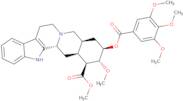Deserpidine
CAS: 131-01-1
Ref. 3D-AAA13101
| 5mg | Descatalogado | ||
| 10mg | Descatalogado | ||
| 25mg | Descatalogado | ||
| 50mg | Descatalogado | ||
| 100mg | Descatalogado | ||
| 250mg | Descatalogado |
Información del producto
- (1S,2R,3R,4aS,13bR,14aS)-2-méthoxy-3-{[(3,4,5-triméthoxyphényl)carbonyl]oxy}-1,2,3,4,4a,5,7,8,13,13b,14,14a-dodécahydroindolo[2',3':3,4]pyrido[1,2-b]isoquinoléine-1-carboxylate de méthyle
- (3b,16b,17a,18b,20a)-17-Methoxy-18-[(3,4,5-trimethoxybenzoyl)oxy]-3,20-yohimban-16-carboxylic Acid Methyl Ester
- 11-Demethoxyreserpine
- 11-Desmethoxyreserpine
- 17.alpha.-Methoxy-18.beta.-[(3,4,5-trimethoxybenzoyl)oxy]-3.beta.,20.alpha.-yohimban-16.beta.-carboxylic acid methyl ester
- 17a-Methoxy-18b-[(3,4,5-trimethoxybenzoyl)oxy]-3b,20a-yohimban-16b-carboxylic Acid Methyl Ester
- 3β,20α-Yohimban-16β-carboxylic acid, 18β-hydroxy-17α-methoxy-, methyl ester, 3,4,5-trimethoxybenzoate (ester)
- Benz[g]indolo[2,3-a]quinolizine, yohimban-16-carboxylic acid deriv.
- Canescin
- Canescine
- Ver más sinónimos
- Canescine (Rauwolfia)
- Deserpic acid, methyl ester, 3,4,5-trimethoxybenzoate
- Deserpidic Acid Methyl Ester 3,4,5-Trimethoxybenzoate
- Deserpidin
- Deserpidina
- Harmonyl
- Methyl (3Beta,16Beta,17Alpha,18Beta,20Alpha)-17-Methoxy-18-{[(3,4,5-Trimethoxyphenyl)Carbonyl]Oxy}Yohimban-16-Carboxylate
- Methyl (3beta,16beta,17alpha,18beta,20alpha)-17-methoxy-18-[(3,4,5-trimethoxybenzoyl)oxy]yohimban-16-carboxylate
- Methyl-(1S,2R,3R,4aS,13bR,14aS)-2-methoxy-3-{[(3,4,5-trimethoxyphenyl)carbonyl]oxy}-1,2,3,4,4a,5,7,8,13,13b,14,14a-dodecahydroindolo[2',3':3,4]pyrido[1,2-b]isochinolin-1-carboxylat
- Nsc 72138
- Raunormin
- Raunormine
- Recanescin
- Recanescine
- Reserpidine
- Yohimban-16-carboxylic acid, 17-methoxy-18-[(3,4,5-trimethoxybenzoyl)oxy]-, methyl ester, (3β,16β,17α,18β,20α)-
- methyl (1S,2R,3R,4aS,13bR,14aS)-2-methoxy-3-{[(3,4,5-trimethoxyphenyl)carbonyl]oxy}-1,2,3,4,4a,5,7,8,13,13b,14,14a-dodecahydroindolo[2',3':3,4]pyrido[1,2-b]isoquinoline-1-carboxylate
Deserpidine is a hydroxyl group-containing drug that is administered orally. It is used in the treatment of infectious diseases, such as tuberculosis and leprosy. It has been shown to be toxic to humans when taken at doses greater than 100 milligrams per day for more than two weeks. Deserpidine is not metabolized by the body and can have drug interactions with other drugs that are metabolized by the liver or kidneys (e.g., barbiturates). Deserpidine has been shown to be effective in the prevention of brain damage after an ischemic stroke, which may be due to its ability to reduce oxidative stress and protect against neuronal death.





